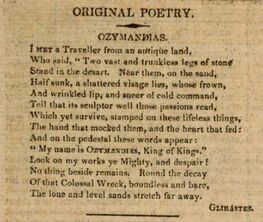Literature:Ozymandias: Difference between revisions
No edit summary |
No edit summary |
||
| Line 32: | Line 32: | ||
== Ayeri == | == Ayeri == | ||
{{Contains Ayeri|page|pos=right}} | {{Contains Ayeri|page|pos=right}} | ||
{| border="0" cellspacing="0" cellpadding="5 | {| border="0" cellspacing="0" cellpadding="5" | ||
|- style="vertical-align: top;" border="0" cellspacing="20" cellpadding="0" | |- style="vertical-align: top;" border="0" cellspacing="20" cellpadding="0" | ||
|<poem class="Ayer" language="qay"> | |<poem class="Ayer" language="qay"> | ||
Latest revision as of 08:31, 17 April 2024
 |
| Songs & poems |
|---|
| Stories & legends |
| Fables & declarations |
| Religious texts |
| Word-list templates |
|
| Relays |
|
Starlings' Song |
| Library portal |
|
|
|
Source
- English
I met a traveller from an antique land,
Who said, “Two vast and trunkless legs of stone
Stand in the desert. Near them, on the sand,
Half sunk, a shattered visage lies, whose frown,
And wrinkled lip, and sneer of cold command,
Tell that its sculptor well those passions read,
Which yet survive, stamped on these lifeless things,
The hand that mocked them, and the heart that fed:
And on the pedestal these words appear:
“My name is Ozymandias, King of Kings.
Look on my works ye Mighty, and despair!”
No thing beside remains. Round the decay
Of that Colossal Wreck, boundless and bare,
The lone and level sands stretch far away.
References
- Shelley, Percy Bysshe "Glirastes" (11 January 1818). "Ozymandias". The Examiner. No. 524. London. p. 24 – via HathiTrust.
Translations
Ayeri
s peNlYNF Asno similen tdo,ANF |
Sa pengalyang asano similena tado, ang |

